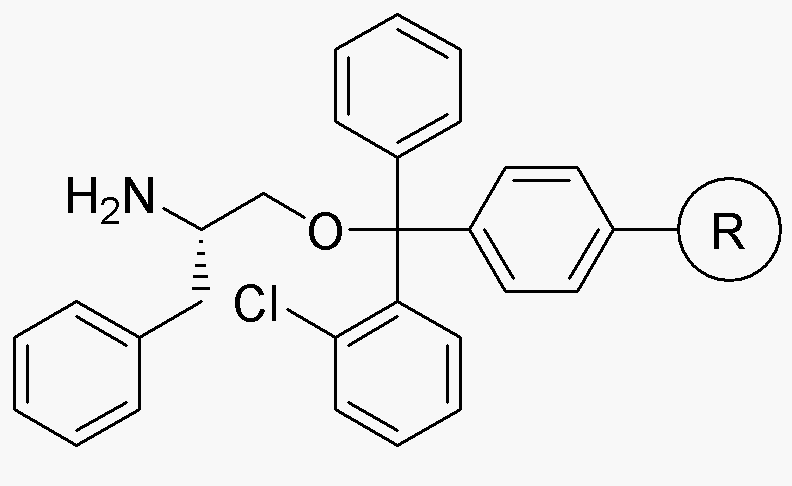L-Phenylalaninol 2-chlorotrityl resin (0.2 - 0.6 mmol/g, 200 - 400 mesh) is widely utilized in research focused on:
- Peptide Synthesis: This resin is commonly used in solid-phase peptide synthesis, allowing researchers to efficiently create peptides with high purity and yield. Its functional groups facilitate the attachment of amino acids, streamlining the synthesis process.
- Drug Development: In pharmaceutical research, the resin aids in the development of new drug candidates by enabling the rapid synthesis of peptide-based therapeutics, which are crucial for treating various diseases.
- Bioconjugation: The resin can be employed in bioconjugation techniques, where it helps attach biomolecules to surfaces or other molecules, enhancing the development of targeted drug delivery systems.
- Analytical Chemistry: Researchers utilize this resin in chromatography applications, where it serves as a stationary phase for separating complex mixtures, improving the accuracy of analytical results.
- Custom Resin Development: The versatility of this resin allows for the customization of chemical properties, making it ideal for researchers looking to tailor resins for specific applications in various fields, including materials science and nanotechnology.
General Information
Properties
Safety and Regulations
Applications
L-Phenylalaninol 2-chlorotrityl resin (0.2 - 0.6 mmol/g, 200 - 400 mesh) is widely utilized in research focused on:
- Peptide Synthesis: This resin is commonly used in solid-phase peptide synthesis, allowing researchers to efficiently create peptides with high purity and yield. Its functional groups facilitate the attachment of amino acids, streamlining the synthesis process.
- Drug Development: In pharmaceutical research, the resin aids in the development of new drug candidates by enabling the rapid synthesis of peptide-based therapeutics, which are crucial for treating various diseases.
- Bioconjugation: The resin can be employed in bioconjugation techniques, where it helps attach biomolecules to surfaces or other molecules, enhancing the development of targeted drug delivery systems.
- Analytical Chemistry: Researchers utilize this resin in chromatography applications, where it serves as a stationary phase for separating complex mixtures, improving the accuracy of analytical results.
- Custom Resin Development: The versatility of this resin allows for the customization of chemical properties, making it ideal for researchers looking to tailor resins for specific applications in various fields, including materials science and nanotechnology.
Documents
Safety Data Sheets (SDS)
The SDS provides comprehensive safety information on handling, storage, and disposal of the product.
Product Specification (PS)
The PS provides a comprehensive breakdown of the product’s properties, including chemical composition, physical state, purity, and storage requirements. It also details acceptable quality ranges and the product's intended applications.
Certificates of Analysis (COA)
Search for Certificates of Analysis (COA) by entering the products Lot Number. Lot and Batch Numbers can be found on a product’s label following the words ‘Lot’ or ‘Batch’.
Numéro de catalogue
Numéro de lot/série
Certificates Of Origin (COO)
This COO confirms the country where the product was manufactured, and also details the materials and components used in it and whether it is derived from natural, synthetic, or other specific sources. This certificate may be required for customs, trade, and regulatory compliance.
Numéro de catalogue
Numéro de lot/série
Safety Data Sheets (SDS)
The SDS provides comprehensive safety information on handling, storage, and disposal of the product.
DownloadProduct Specification (PS)
The PS provides a comprehensive breakdown of the product’s properties, including chemical composition, physical state, purity, and storage requirements. It also details acceptable quality ranges and the product's intended applications.
DownloadCertificates of Analysis (COA)
Search for Certificates of Analysis (COA) by entering the products Lot Number. Lot and Batch Numbers can be found on a product’s label following the words ‘Lot’ or ‘Batch’.
Numéro de catalogue
Numéro de lot/série
Certificates Of Origin (COO)
This COO confirms the country where the product was manufactured, and also details the materials and components used in it and whether it is derived from natural, synthetic, or other specific sources. This certificate may be required for customs, trade, and regulatory compliance.


